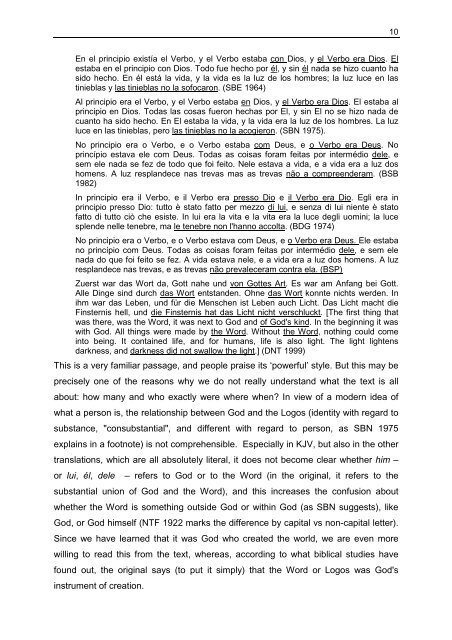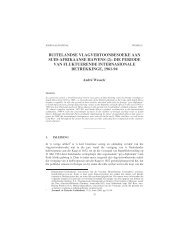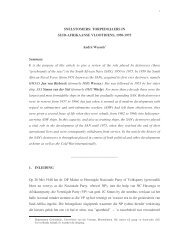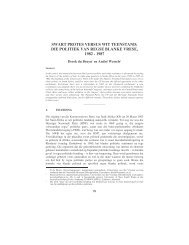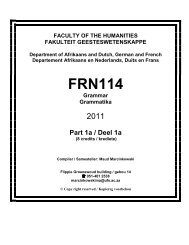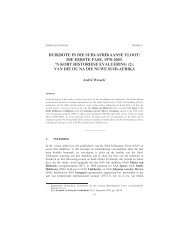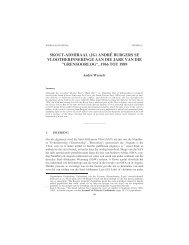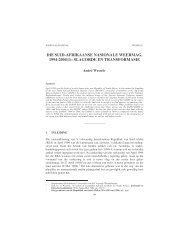Function plus Loyalty: Ethics in Professional Translation
Function plus Loyalty: Ethics in Professional Translation
Function plus Loyalty: Ethics in Professional Translation
Create successful ePaper yourself
Turn your PDF publications into a flip-book with our unique Google optimized e-Paper software.
En el pr<strong>in</strong>cipio existía el Verbo, y el Verbo estaba con Dios, y el Verbo era Dios. El<br />
estaba en el pr<strong>in</strong>cipio con Dios. Todo fue hecho por él, y s<strong>in</strong> él nada se hizo cuanto ha<br />
sido hecho. En él está la vida, y la vida es la luz de los hombres; la luz luce en las<br />
t<strong>in</strong>ieblas y las t<strong>in</strong>ieblas no la sofocaron. (SBE 1964)<br />
Al pr<strong>in</strong>cipio era el Verbo, y el Verbo estaba en Dios, y el Verbo era Dios. El estaba al<br />
pr<strong>in</strong>cipio en Dios. Todas las cosas fueron hechas por El, y s<strong>in</strong> El no se hizo nada de<br />
cuanto ha sido hecho. En El estaba la vida, y la vida era la luz de los hombres. La luz<br />
luce en las t<strong>in</strong>ieblas, pero las t<strong>in</strong>ieblas no la acogieron. (SBN 1975).<br />
No pr<strong>in</strong>cipio era o Verbo, e o Verbo estaba com Deus, e o Verbo era Deus. No<br />
pr<strong>in</strong>cípio estava ele com Deus. Todas as coisas foram feitas por <strong>in</strong>termédio dele, e<br />
sem ele nada se fez de todo que foi feito. Nele estava a vida, e a vida era a luz dos<br />
homens. A luz resplandece nas trevas mas as trevas não a compreenderam. (BSB<br />
1982)<br />
In pr<strong>in</strong>cipio era il Verbo, e il Verbo era presso Dio e il Verbo era Dio. Egli era <strong>in</strong><br />
pr<strong>in</strong>cipio presso Dio: tutto è stato fatto per mezzo di lui, e senza di lui niente è stato<br />
fatto di tutto ciò che esiste. In lui era la vita e la vita era la luce degli uom<strong>in</strong>i; la luce<br />
splende nelle tenebre, ma le tenebre non l'hanno accolta. (BDG 1974)<br />
No pr<strong>in</strong>cipio era o Verbo, e o Verbo estava com Deus, e o Verbo era Deus. Ele estaba<br />
no pr<strong>in</strong>cípio com Deus. Todas as coisas foram feitas por <strong>in</strong>termédio dele, e sem ele<br />
nada do que foi feito se fez. A vida estava nele, e a vida era a luz dos homens. A luz<br />
resplandece nas trevas, e as trevas não prevaleceram contra ela. (BSP)<br />
Zuerst war das Wort da, Gott nahe und von Gottes Art. Es war am Anfang bei Gott.<br />
Alle D<strong>in</strong>ge s<strong>in</strong>d durch das Wort entstanden. Ohne das Wort konnte nichts werden. In<br />
ihm war das Leben, und für die Menschen ist Leben auch Licht. Das Licht macht die<br />
F<strong>in</strong>sternis hell, und die F<strong>in</strong>sternis hat das Licht nicht verschluckt. [The first th<strong>in</strong>g that<br />
was there, was the Word, it was next to God and of God's k<strong>in</strong>d. In the beg<strong>in</strong>n<strong>in</strong>g it was<br />
with God. All th<strong>in</strong>gs were made by the Word. Without the Word, noth<strong>in</strong>g could come<br />
<strong>in</strong>to be<strong>in</strong>g. It conta<strong>in</strong>ed life, and for humans, life is also light. The light lightens<br />
darkness, and darkness did not swallow the light.] (DNT 1999)<br />
This is a very familiar passage, and people praise its ‘powerful’ style. But this may be<br />
precisely one of the reasons why we do not really understand what the text is all<br />
about: how many and who exactly were where when? In view of a modern idea of<br />
what a person is, the relationship between God and the Logos (identity with regard to<br />
substance, "consubstantial", and different with regard to person, as SBN 1975<br />
expla<strong>in</strong>s <strong>in</strong> a footnote) is not comprehensible. Especially <strong>in</strong> KJV, but also <strong>in</strong> the other<br />
translations, which are all absolutely literal, it does not become clear whether him –<br />
or lui, él, dele – refers to God or to the Word (<strong>in</strong> the orig<strong>in</strong>al, it refers to the<br />
substantial union of God and the Word), and this <strong>in</strong>creases the confusion about<br />
whether the Word is someth<strong>in</strong>g outside God or with<strong>in</strong> God (as SBN suggests), like<br />
God, or God himself (NTF 1922 marks the difference by capital vs non-capital letter).<br />
S<strong>in</strong>ce we have learned that it was God who created the world, we are even more<br />
will<strong>in</strong>g to read this from the text, whereas, accord<strong>in</strong>g to what biblical studies have<br />
found out, the orig<strong>in</strong>al says (to put it simply) that the Word or Logos was God's<br />
<strong>in</strong>strument of creation.<br />
10


